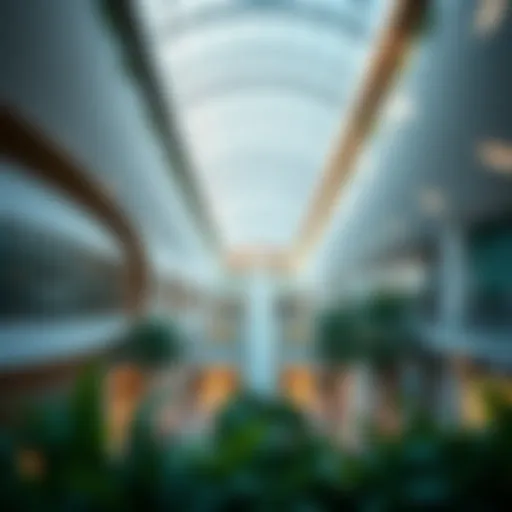Insights into Dubai's Real Estate Market Dynamics


Intro
In recent years, Dubai has emerged not just as a touristic hotspot but as a global beacon for property investors and homeowners alike. A melting pot of cultures and aspirations, the real estate market in this vibrant city offers a plethora of opportunities. From luxury high-rises that touch the sky to more humble residential areas, there’s something for everyone. Moreover, the city’s strategic location between the East and West further highlights its attractiveness.
The goal of this exploration is to dissect the various layers of Dubai’s dynamic real estate sector. By doing so, we seek to present a well-rounded narrative that encapsulates current market trends, investment perspectives, and factors that shape property decisions. Whether you are an investor, buyer, or even a seasoned agent, understanding this market is critical for making informed decisions.
As we navigate through the sections, keep in mind that the nuances of property management, the evolving landscape of housing, and cutting-edge design philosophies will also be discussed. Each element will contribute to a clearer picture of what to expect when engaging with Dubai’s real estate.
From market trends to essential buying tips, every piece of information will be geared towards enhancing your understanding of this exciting marketplace.
Prelims to Dubai's Real Estate Landscape
Dubai has made quite the name for itself on the global real estate stage. Nestled at the crossroads of Europe, Asia, and Africa, this thriving metropolis is not just known for its luxurious shopping malls or towering skyscrapers, but also for its ever-evolving real estate market that attracts investors from around the world. This section aims to dive deep into the fabric of Dubai's real estate landscape, exploring the vital elements that have contributed to its transformation into a preferred choice for many.
The importance of understanding the real estate landscape in Dubai cannot be overstated. For investors and potential homeowners alike, having insights into this maturing market is crucial. While the glitzy marketing campaigns often spotlight extravagant projects and opulent lifestyles, beneath the surface lies a wealth of information regarding market dynamics, historical milestones, and emerging trends that shape the purchasing and investment climate.
Historical Context of Dubai's Growth
From its humble beginnings as a fishing village, the metamorphosis of Dubai is nothing short of astonishing. The discovery of oil in the 1960s was a catalytic moment, sparking rapid economic development that positioned Dubai as a financial hub. The government's foresight in steering economic diversity beyond oil dependency has played a pivotal role in the real estate sector’s boom.
Real estate projects like the Burj Khalifa and the Palm Jumeirah have not only redefined the skyline but have also solidified Dubai’s status as an international icon. Understanding this historical backdrop provides clarity on why the market pulsates with vibrancy today. Investors who grasp this timeline can better forecast future trends, ensuring informed decision-making.
Key Players in the Market
Navigating Dubai's real estate market requires familiarity with its key players, which range from local developers to global investment firms. The presence of influential organizations like Emaar Properties and DAMAC Properties has been instrumental in shaping the market’s landscape.
- Emaar Properties: Known for world-renowned projects, Emaar has been at the heart of Dubai's transformation, driving massive developments that attract both investors and residents alike.
- DAMAC Properties: This developer specializes in luxury real estate and has carved a niche in high-end residential and commercial spaces.
Additionally, real estate brokers and legal consultants also play significant roles. Investors should consider partnering with established agencies for better insights and streamlined transactions. Understanding who the dominant players are—and how they interact with regulatory frameworks—can empower investors and homebuyers in negotiating the best deals and aligning their strategies with the market's demands.
The real estate landscape in Dubai is not merely a space for buying and selling; it is a complex ecosystem where historical evolution and key market players intersect to create an environment ripe with potential. As this article progresses, it will delve further into the nuances of the current market conditions and what they signal for investors in the foreseeable future.
Current Market Trends
Understanding current market trends is essential for anyone looking to navigate Dubai's real estate scene effectively. This ever-evolving landscape can shape investment decisions, highlight emerging opportunities, and indicate shifts in buyer preferences. Whether you are an investor eyeing high-return properties or a first-time buyer considering stability, staying attuned to these trends can provide a significant edge.
Residential Property Trends
The residential property market in Dubai has experienced a noteworthy transformation. Prices have fluctuated, influenced by various internal and external factors. For instance, the demand for apartments has seen a resurgence, particularly in well-developed areas like Dubai Marina and Downtown Dubai.
Notably, investors are increasingly inclined towards off-plan properties, often drawn by the promise of payment plans and long-term capital appreciation. The introduction of new regulations aimed at boosting buyer confidence has also paved the way for more foreign investments. Key statistics indicate that areas such as Jumeirah Village Circle are gaining traction due to affordability combined with an appealing lifestyle.
Key Elements of the Residential Market:
- Diverse Property Types: From luxe villas to compact studios, the options are abundant.
- Market Resilience: Despite global uncertainties, the demand remains robust.
- Investment Potential: Certain neighborhoods show promising appreciation rates, ideal for savvy investors.
Commercial Sector Developments
Dubai's commercial property sector is experiencing revitalization with the rise of co-working spaces and flexible office arrangements. The shift towards remote working during recent years has made business owners reconsider their spatial needs. Now, more companies are seeking dynamic environments that promote collaboration and productivity.
Furthermore, the central business district is witnessing both renovations and new constructions. Projects like One Za'abeel, which boasts the world's highest building, are redefining the skyline.
Here are some focal points within the commercial realm:
- Increased Demand for Flex Spaces: Businesses are favoring adaptable environments.
- High-End Developments: Luxury office spaces equipped with state-of-the-art amenities are in vogue.
- Emerging Business Hubs: Locations like Dubai Design District are capturing attention for their creative appeal.
Emerging Neighborhoods
As the city grows, so do its neighborhoods. Areas like Dubai Hills Estate and Mirdif are garnering interest for their balanced blend of lifestyle and accessibility. These emerging locations provide a refreshing take on suburban living, while still connecting residents to city conveniences.
Investors should keep a keen eye on these neighborhoods for potential breakthroughs:
- Dubai Hills Estate: Boasting stunning community parks and schools, it is rapidly rising in popularity.
- Mirdif: Known for its family-friendly atmosphere and affordability, Mirdif attracts a diverse demographic, creating a vivid community spirit.


"Emerging neighborhoods reflect not just the future of living but the essence of Dubai's evolving culture. With careful attention, one can unlock opportunities before they blossom."
Investment Opportunities
Investment in Dubai's real estate market presents a plethora of advantages that can make it an attractive proposition for both local and international investors. The diverse opportunities available cater to a wide range of budgets and investment strategies, appealing to those looking for high returns or stable long-term gains. As understanding the intricacies of these opportunities is vital, we will explore the landscape through the lens of regulations, potential returns, and investment timing.
Foreign Investment Regulations
Navigating the seas of foreign investment regulations in Dubai can be a bit of a maze, but with the right compass, it can lead to lucrative opportunities. The UAE has established a set of laws to encourage foreign investment in real estate, reflecting its ongoing strategy to foster a welcoming business environment.
One notable aspect is that foreigners can own property in designated areas, often referred to as freehold areas. These zones are scattered throughout Dubai, offering a range of choices from opulent beachfront villas to sleek modern apartments in bustling city districts. However, it's essential to remain aware of the specific regulatory requirements that come into play. Foreign investors should familiarize themselves with the need for a residency visa in many cases, as well as the obligation to register properties with the Dubai Land Department.
"Dubai’s welcoming attitude towards investors aims to create a vibrant and diversified economy."
Additionally, the introduction of the new Golden Visa program enhances the appeal for long-term investments, allowing expatriates to gain long-term residency benefits. This initiative is a testament to Dubai’s commitment to fostering a thriving investment climate, so understanding these regulations can be your ticket to entering the real estate market here.
High-Return Properties
In the world of real estate, the term high-return properties usually grabs attention. Investors often have an eye for projects that promise hefty returns, and in Dubai, certain neighborhoods stand out. The areas surrounding Dubai Marina, Downtown Dubai, and emerging hotspots like Dubai Creek Harbour offer properties that are ripe for appreciation.
Investors should look out for:
- Off-Plan Properties: Buying during the initial stages of development often allows for lower prices and higher potential returns upon completion.
- Luxury Developments: Market demand for high-end options remains strong, especially among expatriates and affluent locals.
- Short-Term Rentals: Considering Dubai’s popularity as a tourist destination, properties suited for short-term rentals can yield impressive profitability, especially during peak seasons.
Investing in properties with a focus on the buy-and-hold strategy can also lead to excellent returns in the long run, considering Dubai’s competitive real estate market.
Long-Term vs. Short-Term Investments
When it comes to strategizing your investment in Dubai, understanding the difference between long-term and short-term investments is crucial. Long-term investments typically involve purchasing property with the intent of holding it for several years. The appreciation in property value over time, coupled with rental income, can lead to substantial wealth accumulation.
On the flip side, short-term investments, which might involve flipping properties or investing in the short-term rental market, provide another pathway. Given Dubai’s tourism boom, properties intended for short-term rental can turn a tidy profit, especially if marketed well. The key considerations for choosing between these two strategies include:
- Market Conditions: Understanding current demand and market saturation in short-term rentals can guide your decision.
- Investment Goals: Assess your financial goals. Would quick returns align with your expectations, or are you planning for the long haul?
- Risk Tolerance: Short-term investments can yield quick profits, but they often come with a higher risk, whereas long-term can be steadier, albeit with slower gains.
Navigating the Buying Process
Understanding how to effectively navigate the buying process is pivotal for anyone looking to invest in Dubai's real estate market, be it a first-time buyer or an experienced investor. This journey incorporates several elements, from the documentation needed to secure a property to knowing how to choose the right one and understanding your financing options. Grasping these components ensures a smoother transition into homeownership or investment within Dubai.
Documentation and Legal Requirements
In Dubai, the documentation process can feel overwhelming at first glance. However, it’s essential to know that having the correct paperwork is non-negotiable and lays the foundation for a successful real estate transaction.
First off, buyers must present a valid passport, along with a copy of their UAE residency visa if applicable. It’s also prudent to prepare documents like proof of income or bank statements, which can help when dealing with financial institutions.
Understanding the legal requirements is equally important. The Dubai Land Department (DLD) governs real estate transactions within the emirate. Buyers must register their purchase with the DLD, which entails paying a registration fee—often around 4% of the property price. Furthermore, hiring a legal advisor can be beneficial to navigate local laws and customs effectively.
"Failing to prepare is preparing to fail."
Completing your due diligence is vital. Engaging a real estate agent does pay off. They can guide which paperwork is necessary and help avoid pitfalls that could arise during the buying process.
Choosing the Right Property
Making the right choice when it comes to property can be the difference between a good investment and a regrettable one. The Dubai property market is diverse, offering everything from high-rise apartments in Dubai Marina to spacious villas in Arabian Ranches.
When selecting a property, consider factors such as location, type, and amenities. Are you looking for a lively neighborhood with easy access to public transport, or do you prefer a serene area with parks and schools nearby? Noting what you value most can streamline your search significantly.
It’s wise to evaluate the long-term potential of the area. Emerging neighborhoods often feature lower prices but promise substantial growth in the future. A little bit of research here can serve a buyer well. Understand the goals behind your investment to align with the property that fits best.
Financing Options Available
Financing a property in Dubai can be more flexible than in many other global cities. Several banks and financial institutions offer mortgages, making it easier to step into the homeowner's shoes. However, knowing your options is crucial for making a sound investment.
Buyers can consider a few financing structures:
- Fixed-rate mortgage: This type allows borrowers to lock in a particular interest rate for a defined period. It's perfect for those who value predictability in their payments.
- Variable-rate mortgage: This option has interest rates that can fluctuate depending on the market, potentially leading to lower monthly payments but also carrying risks if rates rise.
- In-house financing: Some developers offer financing plans that allow for an easier payment structure directly through them, often with lower upfront costs.


When weighing financing options, it’s advised to get pre-approval from banks. This process gives you a clearer idea about your budget and strengthens your position when making an offer on a property.
Purchasing property in Dubai has its complexities, but with diligence, a well-crafted plan, and an understanding of what’s needed, buyers can successfully navigate through its intricacies.
Understanding Rental Market Dynamics
The rental market in Dubai is more than just numbers on a page; it reflects the intricate web of economic trends, cultural shifts, and demographic changes that shape the city. The importance of grasping the dynamics of this market cannot be overstated, especially for investors and potential tenants. Understanding how these elements interact is crucial for making informed decisions that can lead to success in the bustling Dubai real estate scene.
Knowing the rental market dynamics allows stakeholders to anticipate changes and adapt strategies accordingly. For instance, fluctuations in rental rates often correlate with economic cycles, population growth, and even seasonality. When you understand these relationships, you become better equipped to maximize returns on investment or negotiate favorable lease terms.
Current Rental Rates
Current rental rates in Dubai can vary widely based on a range of factors, including neighborhood, property type, and overall demand. It’s essential to keep your ear to the ground and monitor the changes in this sphere. As of recent reports, average rental prices might hover around AED 80,000 for a one-bedroom apartment in popular districts like Dubai Marina and Downtown Dubai. However, these figures can significantly increase for luxury properties or decrease in areas that may not hold the same appeal.
Factors influencing rental rates include:
- Location: Proximity to popular landmarks and city facilities.
- Property type: High-rise buildings may command different prices compared to older low-rise units.
- Node popularity: Areas like Jumeirah Village Circle or Dubai Silicon Oasis can offer more affordable options versus prime real estate.
"Staying updated with the rental rates is crucial for making sound investment decisions."
Tenant Rights and Responsibilities
In Dubai, tenants enjoy a set of rights and responsibilities that ensure fairness and transparency in rental agreements. Awareness of these legal frameworks is vital for both tenants and landlords to prevent conflicts.
Tenants have a right to:
- Safe and functional living conditions: The landlord must ensure that housing complies with local regulations.
- Privacy and quiet enjoyment: Tenants should have the unimpeded right to enjoy their residence without unwarranted disruptions.
- Return of security deposit: This should occur at the end of the lease, barring any valid deductions for damages.
On the flip side, tenants are responsible for:
- Timely rent payment: Usually stipulated in the rental agreement.
- Damage prevention: Maintaining the property and informing the landlord of any issues.
- Following community rules: Adherence to property management regulations.
Popular Rental Areas in Dubai
Dubai boasts a diverse tapestry of neighborhoods, each with distinct flavors and benefits for renters. Popular rental areas can cater to different lifestyles, from expatriates seeking vibrant communities to families looking for quieter suburban life.
Some of the standout rental areas include:
- Dubai Marina: Famed for its waterfront living, this area is a hotspot for both expatriates and professionals. The views and lifestyle amenities are phenomenal.
- Jumeirah Village Circle: Often seen as a family-friendly option, it’s more budget-friendly compared to its coastal counterparts.
- Downtown Dubai: The cultural heartbeat of the city, it offers easy access to shopping and dining but comes with a higher price tag.
- Deira: Famous for its rich heritage and bustling markets, it represents a more affordable locale steeped in history.
The Role of Interior Design in Real Estate
Interior design holds a significant place in the real estate arena, particularly within the fast-paced and lavish market of Dubai. While the physical structure is paramount, the essence of a property often hinges on its interior design. This aspect shapes not only the aesthetic appeal but also functionality and livability, making it a pivotal consideration for investors, buyers, agents, and designers alike.
Understanding the Significance
An expertly designed interior goes beyond mere decoration; it enhances the buyer's emotional connection to a property. A well-thought-out design can lead to increased property value, satisfying buyers' desires for comfort and luxury. As the competition heats up in Dubai's real estate landscape, having a uniquely curated interior can set a property apart, attracting more interested parties.
Moreover, as more homeowners are looking for spaces that align with their lifestyles and personal tastes, the role of interior designers becomes ever more crucial.
Trends Influencing Interior Design
In recent years, several trends have emerged that are reshaping the framework of interior design in Dubai.
- Sustainable Materials: There’s a growing push towards eco-friendly materials and practices. Green design not only attracts environmentally-conscious buyers but also often leads to lower energy costs.
- Technology Integration: Smart homes are becoming the norm. Integrating technology in design—think automated lighting, climate control, and security systems—enhances convenience and modernity.
- Open Spaces: The preference for open floor plans continues to rise, promoting a sense of connection and flow within living spaces. This trend is particularly appealing in urban environments like Dubai, where maximizing space is essential.
- Cultural Influences: Dubai's rich blend of cultures influences interior aesthetics. Whether through vibrant textiles or traditional motifs, merging local elements with contemporary styles captures the spirit of the city.
These trends are not just fleeting fashions; they represent shifts toward more thoughtful living environments, which are tailored to individual preferences and conscious choices.
Maximizing Space in Apartments
Space optimization is a vital aspect of interior design, particularly in high-demand areas like Dubai, where apartments can often feel constricted. Several strategies can be employed to make the most of limited square footage:
- Multi-Functional Furniture: Investing in furniture that serves multiple purposes can transform how spaces are utilized. For instance, a sofa bed is ideal for hosting guests while maintaining a spacious feel.
- Vertical Solutions: Utilizing vertical space through shelves and wall-mounted units can keep the floor area clear. This not only creates an illusion of more space but also provides storage solutions.
- Mirrors and Light: Strategically placing mirrors can create a sense of depth and openness. Additionally, using an abundance of natural light can make any room feel larger and more inviting.
- Color Choices: Light and neutral palettes can make spaces feel more expansive. Dark colors, while stylish, often give a more confined feel, which can be counterproductive in smaller apartments.
"Home is where the heart is, and it is interior design that makes it a welcoming heartbeat."
For further exploration of design techniques, Wikipedia offers comprehensive insights and resources.


Sustainability in Dubai's Real Estate
Sustainability has become a crucial theme in Dubai's real estate sector. As the city continues to push the boundaries of modern development, integrating sustainable practices into the construction and management of properties is more important than ever. This move towards sustainability not only aligns with global environmental goals but also has practical benefits for investors and homeowners.
With the rapid urbanization and ongoing growth, the focus on sustainable real estate can have significant implications. It raises questions on resource management, ecological impact, and how these elements influence buyer preferences and future property values.
Green Building Initiatives
In response to environmental concerns, Dubai has rolled out several initiatives aimed at promoting green building. The Dubai Green Building Code outlines regulations that support energy efficiency, water conservation, and the use of sustainable materials. Developers are increasingly adopting practices such as:
- Innovative Design: Eco-friendly designs which utilize natural light and ventilation.
- Energy-Efficient Systems: Implementation of advanced HVAC systems that reduce energy consumption.
- Renewable Energy Sources: Utilizing solar panels and other renewable technologies to power buildings.
Beyond regulations, community awareness is growing. Events like the Dubai Climate Change Conference highlight the importance of sustainability in decisions made by both developers and buyers. This fosters a greater understanding of how buildings can be designed to harmonize with their environments, offering a dual benefit of ecological responsibility and cost savings.
Impact of Sustainability on Property Value
The growing emphasis on sustainability has a palpable effect on property value in Dubai. Investors are beginning to recognize that properties built with sustainable practices often fetch higher returns in the long run. Factors contributing to this trend include:
- Lower Operating Costs: Green buildings tend to have reduced energy and water utility expenses, making them more attractive to buyers.
- Increased Demand: As environmental awareness rises, buyers are more inclined to choose properties that prioritize sustainability.
- Enhanced Marketability: Properties that showcase sustainable features can distinguish themselves in a crowded market, appealing to a niche that is increasingly influential.
"Investing in green buildings isn't just a trend. It's a recognition of the shifting values of buyers today, who see sustainability as a vital aspect of living in urban environments."
The integration of sustainable practices in real estate is not just an ethical consideration; it’s a savvy economic strategy in Dubai's complex landscape. Developers, investors, and buyers alike have much to gain from aligning their interests with the rise of sustainability in the market.
Future Forecasts for the Property Market
Understanding future forecasts for Dubai's property market is not just an exercise in numbers; it's about equipping investors, buyers, and real estate professionals with the insights needed for strategic decision-making. The forecasting process weaves together current statistical trends, economic indicators, and socio-political factors shaping the landscape. As the dynamics of this vibrant city continue to evolve, grasping the predicted growth and pinpointing potential risks are essential for navigating this complex market.
Predicted Market Growth
Various analysts have different takes on the likely trajectory of Dubai's real estate sector. However, common threads emerge, showcasing an optimistic outlook driven by several core factors:
- Population Growth: The influx of expatriates and foreign nationals continues to bolster the demand for housing, particularly in areas like Dubai Marina and Downtown Dubai. As more individuals and families choose to make Dubai their home, the need for residential units is likely to escalate.
- Infrastructure Development: Major government initiatives, such as the expansion of public transport systems and the development of new commercial hubs, promote property values and enhance the appeal of investing in these locales. Projects like the upcoming Dubai Creek Tower are expected to attract both tourists and residents.
- Expo 2020 and Beyond: Despite the disruptions caused by the pandemic, the legacy of Expo 2020 is anticipated to reverberate through economic sectors, including real estate. The event’s long-term benefits may stimulate a continued surge of interest in the city’s properties.
- Technology Integration: The rise of smart homes and the integration of technology into property management have become selling points that elevate market appeal. Investors are increasingly inclined towards smart developments that promise convenience and efficiency.
As observed by property analysts, comparatives to previous growth spurts indicate that the current trajectory may likely lead to a substantial increase in property prices in the latter part of the decade, especially in the luxury segment.
Potential Risks and Challenges
However, riding on a wave of optimism doesn't come without its caveats. Here are some pitfalls that may lie ahead for the Dubai real estate sector:
- Market Saturation: With numerous high-end developments cropping up, there is a real concern regarding oversupply in certain segments of the market. If not managed wisely, this situation might hinder price growth or even lead to a downturn.
- Evolving Regulations: Changes in local regulations and real estate laws can influence market conditions. Investors need to keep themselves updated on legal frameworks to avoid unforeseen issues that may arise, especially concerning foreign ownership and leasing regulations.
- Economic Dependency: A heavy reliance on oil revenues and tourism poses a risk; fluctuations in global oil prices or geopolitical tensions may dampen market confidence.
- Interest Rate Fluctuations: Any hikes in interest rates from local banks might affect buyers’ ability to secure favorable financing options, ultimately impacting property sales.
A comprehensive view of the market requires acknowledging these variables. Understanding both the growth potentials and the lurking challenges can empower stakeholders to make well-informed decisions in a landscape that is as diverse as its skyline.
> "Forecasting is not about predicting the future, it’s about tuning into the rhythms of the marketplace and responding to them in time."
In summary, while the future may hold exciting prospects for Dubai's property market, vigilance and adaptability are key components for success in this ever-changing environment. By keeping one's ear to the ground and paying attention to both promising elements and potential hazards, investors and homebuyers alike can position themselves advantageously.
Closure
In summary, wrapping up the examination of Dubai's real estate market provides a crucial understanding of the underlying factors and dynamics that govern it. First and foremost, the insights drawn throughout this article can serve as a guiding light for potential investors, homeowners, and real estate professionals who wish to navigate this multifaceted landscape successfully.
Summarizing Key Insights
Reflecting on the key points discussed, several themes stand out:
- Market resilience: Dubai’s property environment exhibits a remarkable ability to bounce back from economic fluctuations. Market trends indicate a steady recovery, particularly in high-return areas like Dubai Marina and Downtown Dubai.
- Investment regulations: The implementation of regulations focused on foreign investments plays a significant role in enhancing market appeal for international stakeholders. Understanding these rules can unlock avenues outside the traditional expectations of buyers.
- Rental dynamics: It’s evident that both tenant rights and responsibilities are shaping the rental landscape, influencing rental rates and occupancy rates in various neighborhoods, especially Jumeirah and Deira.
- Interior design significance: A well-thought-out design not only adds aesthetic value but is also seen as a critical factor that can enhance property value in a competitive market.
This combination of fresh insights provides a robust framework that empowers stakeholders to make well-informed decisions in their real estate endeavors. Each of these elements hinges on a comprehension of local market nuances that can lead to better investment outcomes.
The Importance of Informed Decision Making
Understanding the importance of informed decision-making cannot be overstated. In real estate, purchasing or investing based solely on speculation or superficial knowledge can result in missed opportunities or, worse, financial losses. Thus, the value of meticulous research and awareness cannot be overlooked.
- Risk management: By being informed, potential investors can navigate the pitfalls. Knowledge of market conditions, future trends, and potential challenges can mitigate risks effectively.
- Strategic choices: Decision-making based on reliable information allows for a strategic approach. Comparing neighborhoods, rental yields, and understanding buyer demographics can guide buyers to properties that resonate with their long-term goals.
- Stakeholder empowerment: Real estate agents and analysts who equipped with knowledge can offer better service to their clients, translating complex analytical data into actionable advice.
Ultimately, staying updated on market movements, zoning regulations, and development plans is essential. The dynamic nature of Dubai's property scene coupled with constant updates in legislation signifies that informed choices will always yield the best results in real estate ventures.
“Knowledge is the most powerful weapon which you can use to change the world.” - Nelson Mandela
Thus, maintaining a focus on strategic, informed decision-making throughout your journey in Dubai's real estate is not merely advantageous, but essential. As the city continues to evolve, so will the opportunities within its real estate landscape.















